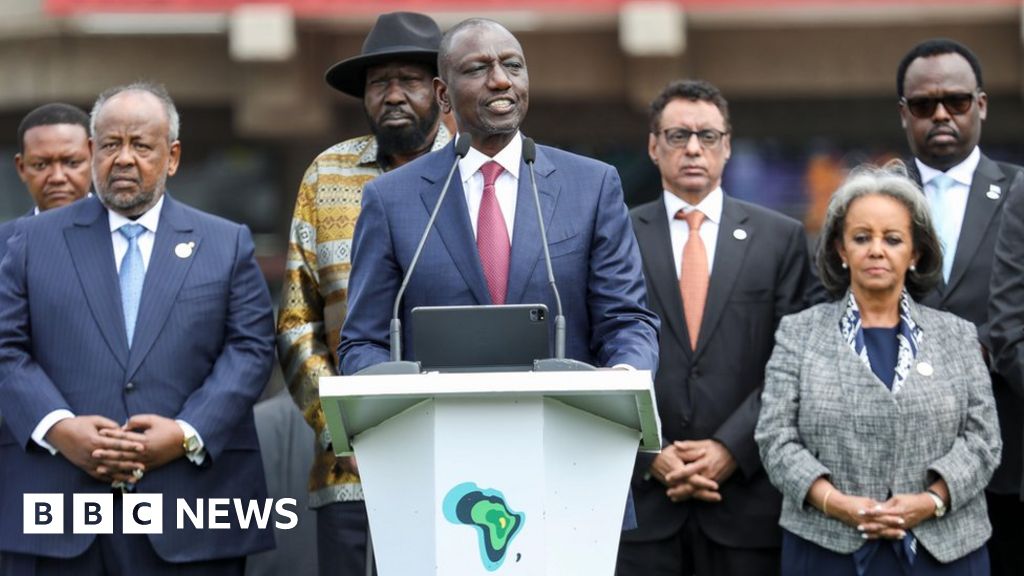- By Widaily Chipilushi and Mercy Gomaa
- BBC News, London and Nairobi
image source, Rex/Shutterstock
Kenyan President William Ruto hosted the Africa Climate Summit
African leaders proposed a global carbon tax system in a joint declaration.
The Nairobi Declaration capped the three-day Africa Climate Summit in the Kenyan capital.
The document, released on Wednesday, called on major polluting countries to allocate more resources to help poor countries.
African heads of state said they would use it as the basis for their negotiating position at the COP28 summit in November.
The Africa Climate Summit was dominated by discussions about how to mobilize financing to adapt to increasingly extreme weather, conserve natural resources and develop renewable energy.
Africa is among the continents most vulnerable to the impact of climate change, but according to the researchers, it only receives about 12% of the roughly $300bn (£240bn) annual funding it needs to deal with climate change.
The Nairobi Declaration urged world leaders to “stand behind the proposal for a global system of carbon taxes, including a carbon tax on fossil fuel trade, shipping and aviation, which could also be augmented by a global financial transaction tax.”
Human rights campaigner Graça Machel told the BBC the announcement was “a huge step forward”.
“Africa is a player, and the world cannot go on without Africa in the centre,” she said.
“Africa is not here to receive help. Africa is here to provide investment opportunities and solutions.”
The Nairobi Declaration said such measures would ensure large-scale financing for climate-related investments and insulate the issue of tax increases from domestic geopolitical and political pressures.
About two dozen countries currently have carbon taxes, according to the International Monetary Fund, but the idea of a global carbon tax has failed to gain much traction.
Kenyan President William Ruto on Tuesday referred to previous proposals in the European Union for a financial transaction tax.
Conservation groups said in 2011 that money raised from the tax should fund environmental priorities, but the European Commission’s proposal did not get the unanimous approval required by the European Council to become law.
Joab Boyer Okanda, a senior advisor at the charity Christian Aid, said the call for a global carbon tax was welcome, but “to make polluters really pay, bogus solutions such as carbon credits that allow polluters a free ride without relevant action need to be resolved.” meaning”. It has been sent to the trash.”
Some activists say credits, which allow polluters to offset emissions by financing green activities, are an excuse for big polluters to continue emitting carbon dioxide.
Mr Ruto said international governments, development banks, private investors and philanthropists had collectively pledged $23 billion (£18 billion) to green projects over the three days, including hundreds of millions to a major carbon markets initiative.
But African leaders have acknowledged that this type of investment is only scratching the surface of the continent’s financial needs, and said more systemic changes are needed.
Some analysts said the summit did not focus enough on how to help Africans adapt to extreme weather.
Protesters also criticized the conference, and demonstrated outside the event against Africa’s plan to sell carbon credits to foreign countries.
Several foreign companies and countries have committed hundreds of millions of carbon credit purchases from the African Carbon Markets Initiative (ACMI), including the United Arab Emirates, which has pledged $450m (£358m) to buy.

“Unapologetic tv specialist. Hardcore zombie trailblazer. Infuriatingly humble problem solver.”






More Stories
SNCF: French high-speed trains disrupted by ‘coordinated sabotage’ ahead of Paris Olympics opening ceremony
Macron Responds to Left-Wing Efforts to Rule France – Politico
At least 229 killed in landslides in Ethiopia | Weather News